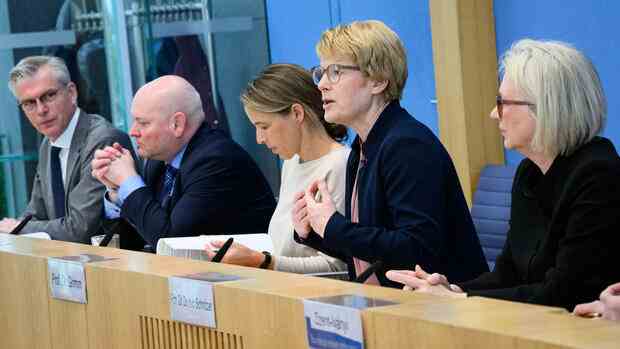Economists expect inflation to remain high in 2023.
(Photo: dpa)
Berlin The economists expect economic growth of 0.2 percent for 2023. This was announced by the German Council of Economic Experts on Wednesday in an updated economic forecast. Last year, the five experts had assumed a minus of 0.2 percent. They also anticipate an average inflation rate of 6.6 percent for the current year.
“The inflation-related loss of purchasing power, the poorer financing conditions and the only slowly recovering foreign demand are preventing a stronger upswing this year and next,” said the chairwoman of the German Council of Economic Experts, Monika Schnitzer. Economic experts are forecasting growth of 1.3 percent for 2024.
The government advisors believe that inflation has now peaked. However, it is still significantly higher and is only likely to decrease slowly. “Inflation is increasingly affecting the economy,” said Martin Werding. “The increased producer prices and the expected wage increases should keep consumer price inflation high into the coming year.”
The tighter monetary policy of the European Central Bank (ECB) worsened financing conditions, which dampened both consumer demand and investment. However, this is only likely to have a noticeable impact on inflation over the course of the year and slow down its development noticeably. “Inflation is still a long way from the ECB’s target of two percent, so further interest rate hikes are likely to be necessary this year,” said Ulrike Malmendier. “However, the high level of uncertainty on the financial markets in recent weeks is making it more difficult for the central banks to fight inflation.”
She added that economic experts are currently not expecting any significant problems on the global financial markets. Despite the crises surrounding the Silicon Valley Bank and Credit Suisse, the supply of credit to the economy is still secured. The current situation cannot be compared with the financial crisis from 2008, emphasized Malmendier.
For 2023, economists expect at most a low GDP growth for Germany.
(Photo: dpa)
Despite the meager growth, the labor market in Germany is likely to develop stably. Employment, for example, should increase slightly by the end of 2024. However, 2023 threatens the fourth year in a row with falling real wages. “At least for 2023, the increase in wages is lower than the expected inflation,” said economist Achim Truger. “An increase in real wages is only to be expected in the coming year.” This should then stimulate private consumption.
National debt should decrease
The government advisors are much more optimistic about public finances. In particular, the expected expenses for the energy price brakes are significantly lower than previously assumed. The German Council of Economic Experts expects a government deficit of 1.6 percent in the current year, which should shrink to 0.4 percent in 2024. The level of debt is expected to fall from 67.4 percent of gross domestic product last year to 63.5 percent in the coming year.
The five economists thus agree with similarly cautious forecasts by other economists. The leading economic research institutes also expect only slight growth in gross domestic product (GDP) for 2023. For example, the Institute for World Economics (IfW) expects growth of 0.5 percent, the Institute for Economic Research Halle (IWH) with 0.4 percent. The Munich-based Ifo Institute, on the other hand, expects a slight drop in GDP of 0.1 percent.
>> Read also: Veronika Grimm criticizes the planned heating ban
However, the forecasts are subject to considerable uncertainty. Economics Veronika Grimm pointed out that a renewed deterioration in the energy supply situation could have a negative impact on growth. The geopolitical tension in dealing with China could also cause problems.
More: recession or growth? Five factors will determine developments in 2023
